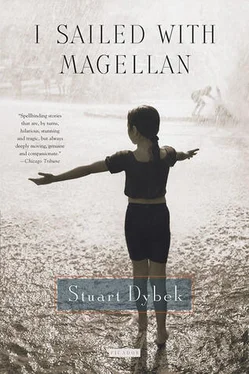“Do your best,” Sister Lucy instructed our class. “This will be the last Christmas composition you will ever write.”
The Christmas composition was an annual assignment at St. Roman, required from each class above third grade. The pieces judged best received prizes, and the top prize winner was read aloud at the Christmas pageant. Not that there really was any competition for top prize: it was reserved for Camille Estrada. She was the best writer in the school. Probably, before Camille, the concept of such a thing as a best writer didn’t even exist at St. Roman. Camille was a prodigy. By fifth grade she’d already written several novels in her graceful A+ cursive and bound them in thread-stitched covers cut from the stays of laundered shirts. They were illustrated — she was a gifted artist as well. And they were filed, complete with checkout cards, in the shelves beside Black Beauty, Call of the Wild , and the other real books in the school library.
Camille’s early works, mostly about animals, had titles like The Squirrel of Douglas Park and The Stallion and the Butterfly. I never actually checked them out, but I read them on the sly one week when I was exiled to the library for detention. Camille loved horses, and they often suffered terribly in her stories. They were the subjects of many of her illustrations: huge, muscular creatures with flared nostrils, often rearing, some winged, some unicorns.
By sixth grade she’d taught herself to type, and then the writing really poured from her. Camille became founder, publisher, editor, and chief reporter of our first school newspaper, To Change the World , as well as translator for an occasional Spanish edition. She represented St. Roman in the Archdiocese of Chicago Essay Contest, writing on why a Catholic code of censorship was needed for pop songs and movies like the Brigitte Bardot film And God Created Woman . It was a foreign film that would never have played in our neighborhood anyway. Still, although none of us had ever seen Bardot on screen, the B.B. of her initials — which also conveniently stood for Big Boobs — mysteriously appeared as a cheer scribbled on the school walls: BB zizboombah! When Camille’s censorship essay won, she got a mention in the Metro section of the Tribune .
At the annual school talent show, where “Lady of Spain” pumped from accordions and virtuosos pounded “Heart and Soul” on the out-of-tune upright to the clatter of tap dancers, Camille would read an original poem written for the occasion. She wasn’t a dramatic reader, but there was something inherently dramatic about her standing before the boomy mike, without a costume or an instrument to hide behind, her eyes glued to the page while she read in a quiet, clear voice.
I liked it when she read aloud because I could watch her without seeming to stare. I’d always been fascinated by the way her myopic eyes illuminated her thin face. Her long lashes drew attention like those on a doll. Beneath them, her liquid, dark eyes gazed out unblinking, serious, enormous. Her voice was colored with a slight Spanish accent. She spoke in a formal way that sounded as if she was cautiously considering each word in English, a language in which she was so fluent on the page. Her reserve made her seem older, though not physically older, like some of the boys who already had faint mustaches, guys like Brad Norky, who actually was older, having been held back. Once, at a talent show, I overheard two elderly women talking about the way Camille had read her poem about the ecstasy of St. Teresa.
“She has an old soul,” one of the women observed, and the other said, “I know what you mean.”
Even back then, in a way, I knew what she meant, too.
From seventh grade on Camille wore rouge that looked artificial against the caramel shade of her skin and made her appear feverish. She got glasses that year: ivory-sparkle cat frames that matched the barrettes clamping back the thick black hair she’d previously worn in braids. She was no longer quite flatchested, though the rose-colored bra outlined beneath the white blouse of her school uniform hardly seemed necessary. She could have used braces.
In seventh grade, a gang of us proudly calling ourselves the Insane Fuckups would sneak off at lunch to our boys’ club — the doorway of an abandoned dry cleaner’s where we’d smoke Luckies, spit, and discuss things like the rumor that some of the girls were washing their school blouses over and over to make the fabric thin in order to show off their underclothes. I made the mistake of mentioning that even Camille Estrada’s bra was showing, and, as if dumbfounded, Norky asked, “No shit? Estrada has titties! You think she might have a hairy pussy, too?” Then he burst into mocking laughter.
Even my best friend, Angel Falcone, couldn’t resist breaking up. “Instead of BB’s she’s got bb’s — bb itas, ” he said, making his voice tiny. “Hey, maybe she’ll publish the news in her paper.”
“Headline!” Norky shouted. “Stop the presses!” and with the chalk he carried to graffiti up our doorway, he printed in huge letters on the sidewalk: ESTRADA HAS bb’s.
He chalked it on the graffitied tunnel wall of the viaduct on Rockwell, and along the bricks of the buildings we passed, and on the asphalt of the street where the little girls drew hopscotch courts alongside the school. It was one of those phrases that inexplicably catches on, and for the next couple of weeks it was every-where — in the boys’ bathroom, at the Washtenaw playground, on the concrete basketball court at the center of the projects: ESTRADA HAS bb’s.
In class, when I’d sneak a glance at her, it seemed her rouged cheeks burned, but perhaps that was only a projection of my secret shame.
Near the end of seventh grade, my desk was moved out into the corridor, where I was banished after topping one hundred demerits in conduct. Then, our teacher that year, Sister Mary Donatille — the only nun who insisted we say the Mary in her name — introduced Partners in Christ. It was an experimental program, borrowing, perhaps, from AA, in that it teamed habitual bad boys with sponsors — good girls — so as to give the boys a taste of the rewards of behaving. I can’t say what it was for the girls, torture probably; for the boys it was a subtle form of humiliation. Camille was assigned to be my Partner in Christ.
At St. Roman, two kinds of kids stayed after school, those in detention and the teachers’ pets who were invited to help the nuns clean the classrooms. Detention time was spent copying chapters from the New Testament, but thanks to Sister Mary Donatille’s experiment, instead of rewriting the Apocalypse, I got to clean the blackboard erasers with Camille. It was an honorary task: only pets were entrusted to take the erasers out behind the school and beat them clean against the wall. Although I’d been reassigned a seat beside Camille in class, we still hadn’t spoken. We stood together, engulfed in chalk dust and an uncomfortable silence relieved only by the muffled thud of felt against brick. In blocky chalk impressions I pounded out F-U-
“I really like your vocabulary,” Camille said.
“Real funny.”
“No, I mean it,” she said. “You have a neat imagination.”
I looked at her, too puzzled to respond. I didn’t know if she was putting me down or putting me on or applying some kind of condescending psychology, or if she was just spacey.
“That story you wrote for Christmas. About the ant. It was so cool. I wanted to publish it in the paper, but it was too long.”
She was referring to “The Enormous Gift,” which I’d written back in sixth grade for the Christmas competition. I frequently missed getting my homework in, but I’d found myself writing the story with an excited concentration I hadn’t associated with schoolwork. The assignment that year had been to write a story about a gift brought to the baby Jesus in his stable at Bethlehem. In my story, the gift was a crumb of bread that weighed a thousand times more than my narrator, an ant, but he hoisted it nonetheless, and after narrow escapes involving spiders, sparrows, the hooves of oxen, and soles of sandals, he finally crept into the manger to offer his gift.
Читать дальше












